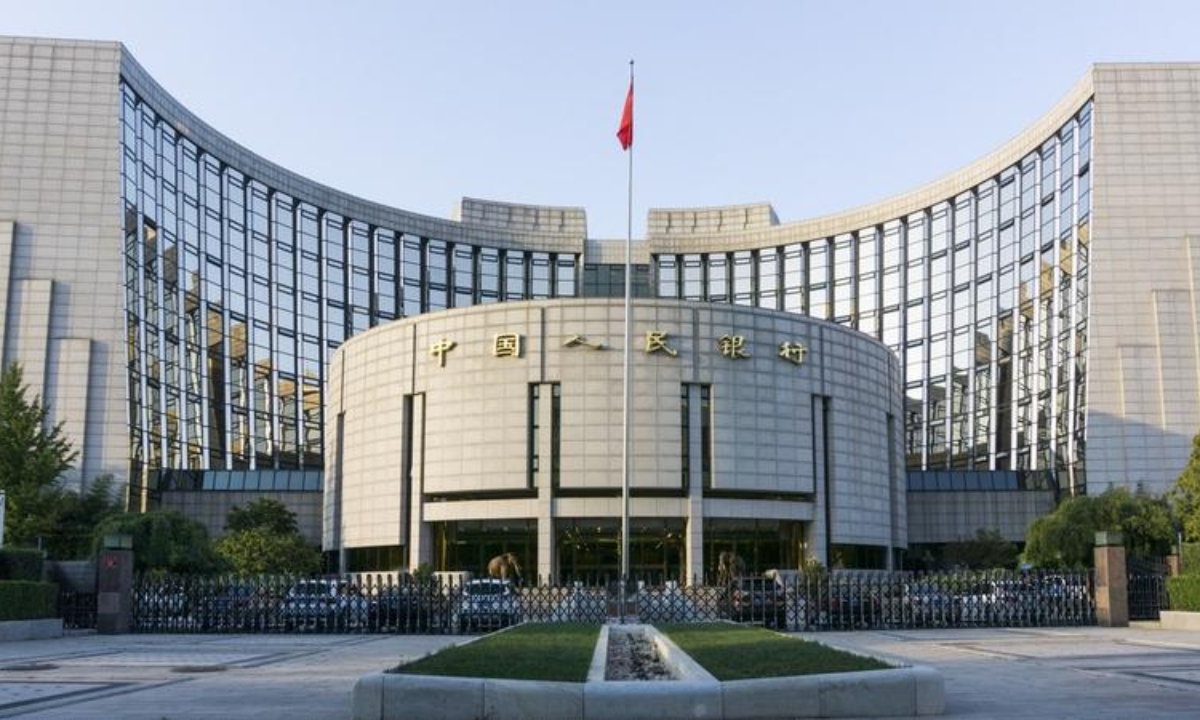
The headquarters of the People's Bank of China in Beijing Photo: IC
China's central bank on Sunday adjusted the pricing mechanism for mortgage rates, as the country aims to lower the financial burden on property owners. In accordance with the central bank's guidance, China's "big four" commercial banks issued statements confirming that they will adjust the interest rates on existing personal housing loans.
As part of a broader effort to stabilize the real estate sector, the policy adjustment will also help to boost consumption, adding to the optimistic sentiment in the market, analysts said.
The People’s Bank of China (PBC) announced on Sunday a significant reduction in mortgage rates for existing home loans, with an average estimated reduction of 0.5 percentage points, CCTV reported.
The adjustment aims to align the rates of existing loans with the national average for newly issued mortgages, thereby easing the interest burden on borrowers, the PBC said.
Commercial banks are required to carry out the adjustments for eligible existing mortgages by October 31, the PBC said.
Following the announcement from the central bank, China's "big four" commercial banks issued statements confirming that they will adjust the interest rates on existing personal housing loans in accordance with the central bank’s guidance.
“The adjustment of the existing mortgage interest rates has a very positive guiding effect. The reduction in monthly payments should have a positive impact in boosting consumer confidence,” Yan Yuejin, research director at Shanghai-based E-house China R&D Institute, told the Global Times on Sunday.
Additionally, commercial personal housing loans will no longer differentiate between first-time and second-time home purchases. The minimum down payment requirement is now set at no less than 15 percent, the PBC said.
First-tier cities including Shanghai, and Guangzhou and Shenzhen in South China’s Guangdong Province all eased their property policies on Sunday.
Shenzhen announced that the minimum down payment ratio for commercial personal housing loans for first-time homebuyers will be adjusted to 15 percent.
Shanghai introduced seven new policies aimed at stabilizing the real estate market, effective from October 1, 2024.
Highlights among the measures include easing purchasing restrictions for non-resident families and individuals. Specifically, the requirement for continuous payment of social insurance or personal income tax has been adjusted to a minimum of one year prior to the purchase date for those buying homes outside the city’s outer ring.
Furthermore, the minimum down payment ratio for commercial personal housing loans for purchasing first homes in Shanghai has been set at no less than 15 percent, while for second homes it has been adjusted to a minimum of 25 percent.
Guangzhou also issued a notice on Sunday saying that all purchase restrictions for local families buying housing in Guangzhou will be lifted, CCTV reported.
The Political Bureau of the Communist Party of China (CPC) Central Committee held a meeting on Thursday to analyze the country’s current economic situation and make further plans for economic work.
Regarding the real estate market, efforts must be made to address public concerns, adjust housing purchase restrictions, reduce existing mortgage rates, improve land, fiscal and taxation, financial and other policies, and promote the formation of a new model of real estate development, the meeting concluded.
The Ministry of Housing and Urban-Rural Development said in a meeting on Sunday that it will support cities, especially first-tier cities, in effectively utilizing their independent real estate market regulation, and will adjust housing purchase restrictions based on local conditions.
It is expected that the pace of adjustments in housing policies across the country will accelerate. These new measures are expected to foster a positive trajectory for the real estate market, laying a solid foundation for continued development, Yan said.




